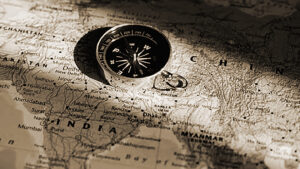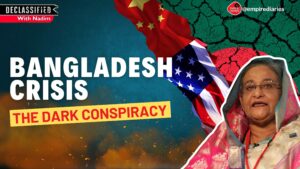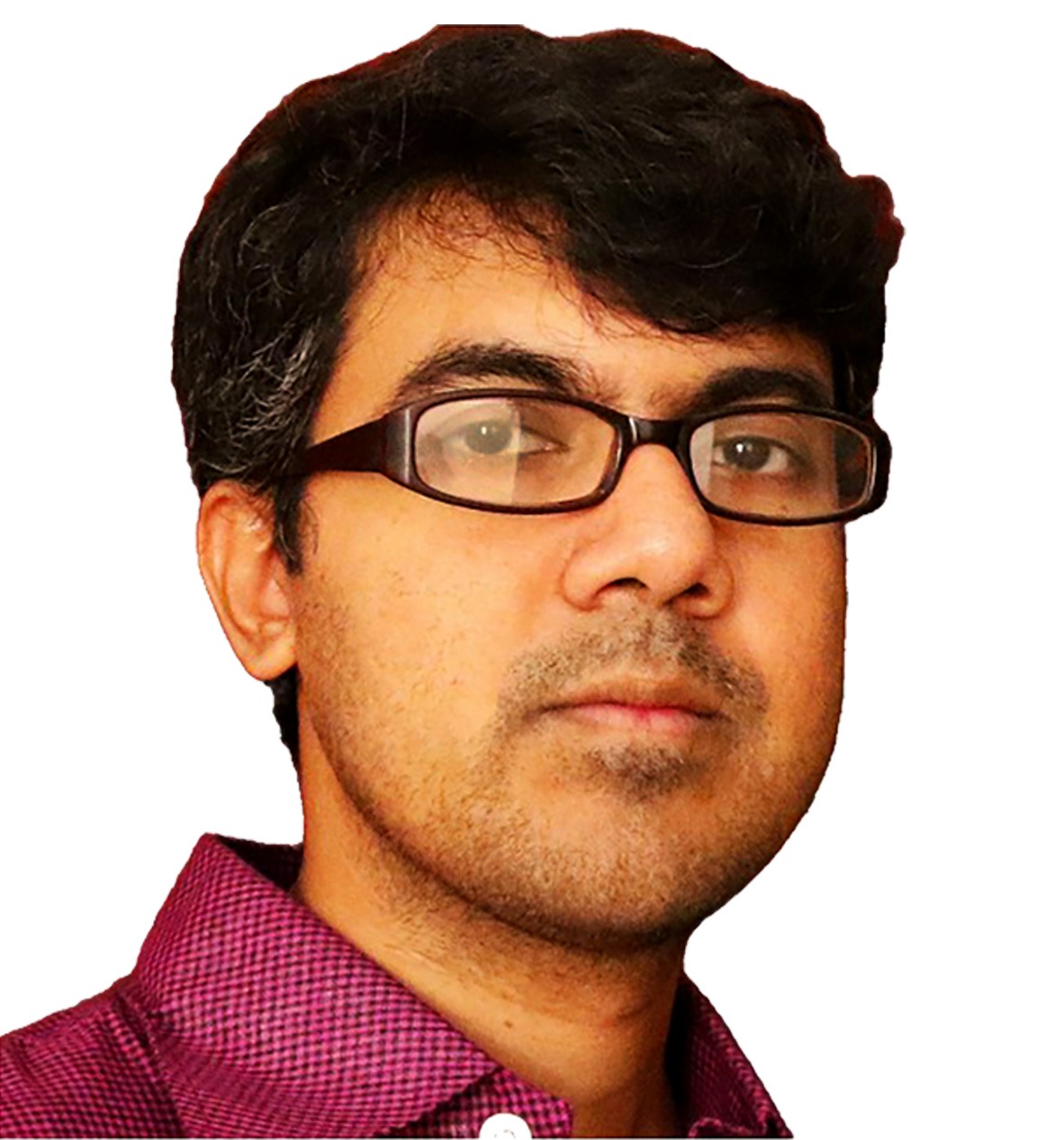COLUMN/ THE HOT POTATO
Nadim Siraj
What is this climate change crisis? It’s a crisis for whom, to be precise?
A crisis for the planet we live in?
A crisis for about 3 billion people who don’t know what they’ll eat today?
A crisis for two-thirds of the world population trapped in the daily cycle of sweatshop jobs?
A crisis for 2 billion people boxed into squalid slums, such as India’s Dharavi, Kenya’s Kibera, Mexico’s Neza, Pakistan’s Orangi?
A crisis for the world’s lockdown-battered migrant workers shoed away to the margins of society?
Let’s try to answer these disturbing questions, one by one.
First – is it a crisis for the planet? It is sheer hubris and insane stupidity for our inconsequential species to think that the planet will come undone because of human-induced climate change. The Earth is 4.5 billion years old. Changes to the Earth’s climate are as old as the planet itself. Climate change is a natural cycle that has been happening for millions and millions of years before Homo sapiens showed up. For 4.5 billion years, climate change – which comprises global cooling and global warming in long, natural cycles – is what has given the Earth’s atmosphere its character.
If anything is really going away, it’s going to be us, humans. The planet will not perish. We will!
The damage that we, as a species, have managed to inflict is restricted to our immediate environment – not the planet as a whole.
CAN WE REALLY CROSS THE LINE?
Here’s the damage we’ve done. We’ve screwed up local weather patterns and the immediate air cover in our industrialised cities. We’ve denuded large patches of forests and the mountainous green cover to satisfy the greed for wood and industry. We’ve choked many of the rivers dry by building lofty dams and by releasing waste water into them. We’ve peppered the urban peripheries with hillocks of trash for vultures to feed on and scavengers to live on. We’ve tainted the skyline in the cities with sophisticated slums called skyscrapers. We got folks in the smoggy cities complaining ‘I can’t breathe’ for reasons beyond racism. We’ve playfully tested over a thousand nuclear bombs on the pretext of scientific advancement.
That may sound like a helluva lot of damage. But from our point of view. Not from the planet’s point of view.
Thankfully, it’s the only damage we can do to the planet, no more than that. The rest of the planet – the vast majority of the Earth’s surface – is still undisturbed, undamaged, and calmly ushering in climate change in routine, million-year cycles, just like we experience seasons and survive them.
The damage, the dump, and the rot we humans are responsible for is only a bunch of minor dots – basically, the large, congested cities – on the planet’s surface that don’t make any difference to this huge celestial body.
All you need to do is to simply trek around the world where humans don’t live in congested messes, or if you’re a couch potato, closely study satellite images and visuals of the Earth’s surface – and you’ll realise how inconsequential we humans are as a bunch of little animals compared to this gigantic planet.
Even in our most dangerous avatar, we humans are specks of dust!
FUTURE? WHAT FUTURE?
Next – is climate change a crisis for 3 billion hungry people out there?
Walk into any of the underpass ghettos in what the West, with its colonial mindset, loves to call the ‘Third World’ and ask them if they worry about the changing climate and the future of the planet.
What climate change? What future? For them, crisis means trying to find leftover food to survive the day. Crisis for them is if there’s enough trash in the dump yard to scavenge for discarded woollies as the long winter arrives. Crisis for them is a tense wait at designated traffic signals for low-pay construction gigs.
Their worries are about now. About today. About the present. They’re about food on the table tonight. They’re about immediate survival. For hungry have-nots who are often awesome subjects of aesthetic photography, well-funded documentaries, and beautifully written inequality reports, worrying about the future is a luxury.
When someone’s present is jacked, to inquire them about the future is to insult them, to humiliate them. To open a scientific discourse with them about global warming and the state of the climate for the next generation is to kick them on their unfed bellies.
What about the South Asian and Southeast Asian sweatshop girls who are underpaid, overworked, and often exploited? What about the reluctant residents of the slums of Dharavi, Kibera, Neza, Orangi? What about the migrant workers who were booted out of every Big City and their only earning avenues by arbitrary lockdowns?
Can you really look into their eyes and ask them this million-dollar question: Are you worried about climate change? Are you worried about the planet’s future?
Only if you want to insult them.
These people don’t live on the margins of society. They’re right at the centre of it. They make up a massive chunk of the human race. So, isn’t the spotlight supposed to fall on their emergencies, the crises for the masses?
CRISIS FOR THE MASSES
There are multiple alarming and perpetual emergencies they’re at war with right now – rising hunger and poverty, escalating income inequality, unprecedented drop in real income, growing job losses, and a constantly miserable standard of living.
They are crises of the present, not the future. But you don’t see this perspective on primetime television, in your social media feed, and on newspaper front pages. Instead, you are told – day in and day out – that there’s only one thing you need to worry about: climate change and the future of the planet.
Enough said about the real emergencies for the masses, let’s talk about the climate crisis itself.
CRISIS FOR THE ELITE
Who is this crisis for, really? Well, for some of the folks up there! The well-to-do, adequately-serviced, assets-owning, financially and militarily insulated, highly educated, intellectual, erudite, and socially refined residents of the ivory tower.
On a planet where two-thirds of humans lead distressed, disturbed, and miserable lives, the changing climate can be an obsession for only the opulent, the rich and powerful, many of whom lead lives that are physically and financially protected from worldly worries.
When you belong to the wealthiest business families, or when you represent the leadership of mighty states, or when you’re in charge of immensely cash-rich religious bodies, or when you’re a celebrated royal sitting on inherited wealth, or when you’re a wildly popular artist or athlete, or when you rise to the top of the pay ladder to be stamped a billionaire – you get this unexplained, innate tendency to worry about frivolous matters.
When you have nothing concrete to fear about – because the food on your table is assured for perhaps the next few generations – you naturally tend to hallucinate or imagine relative non-issues as Frankenstein’s monsters threatening your hard-earned good life. It’s human nature. Many of you reading this observation have experienced it.
This obsession of a section of the opulent and powerful classes of Homo sapiens with imagined or exaggerated emergencies gave birth to what we today call the climate change crisis.
COLONIALISM BY OTHER MEANS
The problem is not that the ivory tower exists. If it exists, that’s because it deserves to exist. The problem is somewhere else. It’s the tendency of a section of the dwellers of the ivory tower to flaunt their historical colonial mindset and superimpose their own worries on the rest of the world as if they’re everyone’s emergencies. Remember junior Bush’s with-us-or-against-us ultimatum? Or world leaders often saying, ‘We’re all in it together’?
As the saying goes, one individual’s crisis can be another individual’s luxury. A wealthy food connoisseur’s concerns about the dearth of enough stylish boutique tea houses in Lutyens Delhi cannot be imposed upon a beggar scavenging trash cans for leftover food on the streets of Old Delhi.
Up there, when they worry about something (climate change, terrorism, coronavirus, Ukraine, Uighurs, mass shootings, Brexit, monkeypox, for instance), we also should worry about it down below, irrespective of how out-of-place it is.
It is colonialism of fear. The colonial era is formally over, according to misleading textbooks and shallow mainstream narratives, but western colonialism continues today by other means – through this artificial imposition of crises.
Let’s not dig into the geopolitics of the need (read: manufacture) of the climate change crisis. We’ll leave it for another day’s discussion! Let’s sign off with this thought-provoking outburst from writer Vijay Prashad (see video), who summed up this whole issue in a few words at a recent COP26 Coalition gathering of activists who are in touch with reality.
Thank you for reading this article. Do remember to check our website EmpireDiaries.com for information and perspectives you are not told. Remember to SUBSCRIBE to our YouTube Channel. Also, follow us on Twitter and on Facebook. WhatsApp ‘Updates’ and directly contact us on 9821045739.
Email is still the best way to avoid Big Tech censorship. Enter your email ID to get our reports direct to your mailbox. Enjoy Reading and Watching.
Email Address:
Subscribe
REPUBLISH! Feel free to republish this article/video on the following terms: (1) Use the credit at the start, (2) Hyperlink this post, (3) Mention our website EmpireDiaries.com with a hyperlink.











